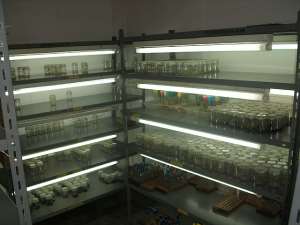
Ghana's scientific community will soon have an ultra-modern biotechnology laboratory facility to aid their agricultural research activities.
The construction of the $1.8million complex in Kumasi started in January 2011 and is expected to be completed in November, 2011.
Biotechnology techniques have served as efficient tools for enhanced agricultural production in developed countries. They are essential for preparing clean planting materials for distribution to farmers.
Micro-propagation – the practice of rapidly multiplying stock plant material to produce a large number of progeny plants – ensures the production of clean planting materials with high crop yield.
It has being reported, for instance, that the use of clean planting materials can lead to about 30% increase in sweet potato tubers.
The biotech facility is an offshoot of the West African Agricultural Productivity Programme (WAAPP), a World Bank funded-project, being implemented by the Ministry of Food and Agriculture and the Crop Research Institute (CRI) of the Council for Scientific and Industrial Research (CSIR).
Jeremy Agyemang, WAAPP Monitoring and Evaluation Officer, tells Luv Fm the lab complex should facilitate the generation and dissemination of new technologies to farmers, processors and other end-users.
According to him, the overall objective is to establish the CSIR-CRI in Kumasi as the West African sub-region hub of root and tuber crops, including cassava, sweet potato, cocoyam and yam.
“This is a biotech lab they can do their tissue-culturing and other advanced cell biology techniques there and we have to develop a centre of specialization for roots and tubers and this is going to be a centre of specialization not only for Ghana but for the whole sub-region. So anyone working on root and tubers anywhere can come to Ghana, Crop Research Institute to do their research and analysis, and interact with other scientists”, Mr. Agyemang stated.
The WAAPP, since take off in 2008, has come up with four new high yielding and disease-tolerant cassava varieties.
Mr. Agyemang says the materials are being disseminated to farmers in 24 districts in Ghana under MOFA's directorate of agricultural extension services.
He expects new varieties of sweet potato and cocoyam to be released next year.
Other countries in the sub-region are also establishing centres of specialization in other agricultural commodities.
Meanwhile, the Director of the Crop Research Institute (CRI) is courting media support to help scale-up the adaptation and application of new technologies by farmers and other end-users.
Dr. Hans Adu-Dapaah says the media has a crucial role to play if agricultural research projects are to make the necessary impact in improving food security and poverty alleviation.
He was addressing a workshop in Kumasi for journalists and scientists on the West African Agricultural Productivity Programme (WAAPP).
The first phase of the 10 year project is expected to end in 2012 at a cost of $15million, involving actors along the supply chain – research scientists, extension workers, processors/industrialists, consumers and donors.
Project implementers are creating a platform to enable journalists and research scientists to exchange ideas on how best to disseminate agricultural technologies developed under the WAAPP for the benefit of farmers, industrialists and consumers.
According to Dr. Adu-Dapaah, increased agricultural productivity can only be achieved when research results can reach the targeted group. The media, he noted, is a vital linkage in technology transfer.
“When this happens agricultural productivity will increase and there will be more food and raw materials for the industries, our farmers will make more money, poverty will be reduced and standard of living will improve for us all. The media therefore has a vital role to play in technology transfer”, he stated.
Story by Kofi Adu Domfeh/Luv Fm/Ghana




 Chief arrested for killing soldier at Kasoa over land
Chief arrested for killing soldier at Kasoa over land
 GAF probes soldier’s murder at Kasoa Millenium City
GAF probes soldier’s murder at Kasoa Millenium City
 Ghana steps up effort to pass new Labour law
Ghana steps up effort to pass new Labour law
 AG advises EOCO against money laundering probe into Cecilia Abena Dapaah’s affai...
AG advises EOCO against money laundering probe into Cecilia Abena Dapaah’s affai...
 May Day: I'll prioritise welfare of workers, abolish compulsory retirement age a...
May Day: I'll prioritise welfare of workers, abolish compulsory retirement age a...
 V/R: Adaklu-Tevikpo murder suspect arrested from hideout
V/R: Adaklu-Tevikpo murder suspect arrested from hideout
 Kasoa: Soldier killed by alleged land guards over land dispute — GAF
Kasoa: Soldier killed by alleged land guards over land dispute — GAF
 Fatal shooting of soldier happened at Gomoa East not Kasoa; stop tarnishing our ...
Fatal shooting of soldier happened at Gomoa East not Kasoa; stop tarnishing our ...
 ‘We condemn unprovoked attack in no uncertain terms’ — GAF on fatal shooting of ...
‘We condemn unprovoked attack in no uncertain terms’ — GAF on fatal shooting of ...
 Ghanaians urged to ensure violence free elections on December 7
Ghanaians urged to ensure violence free elections on December 7
